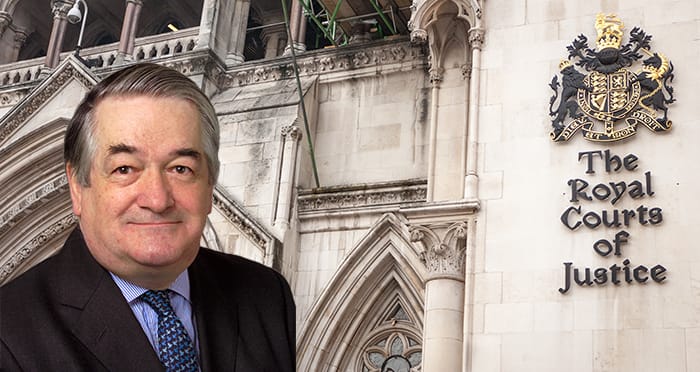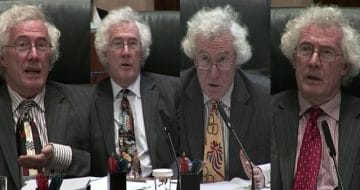Sir James Munby pulls no punches

Errors by courts and judges that left a couple’s final divorce decree potentially void was exposed in a judgment from the former head of the family division, who slammed the state for “washing its hands” of the problem it created by not granting legal aid to the parties to resolve their case.
A “fundamental failure” of the court process meant that a couple, known only as M and P, were granted a “wholly defective” divorce, Sir James Munby, who until July 2018 was President of the Family Division, said in a ruling this week, after court staff and judges failed to spot an error on the divorce petition.
The parties married in London on 19 September 2011. In June 2013, the husband, M, acting in person without help from a lawyer, submitted a divorce petition dated 14 June 2013 to the Willesden County Court.
M had ticked the box on the application stating that he was seeking a divorce on the grounds that the parties had “lived apart for a continuous period of at least two years immediately preceding the presentation of the petition and the respondent consents to a decree/order being granted”.
The petition was returned to M on three occasions before the court was prepared to accept it due to errors in the application, and the petition was issued on 26 July 2013. No one had noticed that, at the time that the petition was issued, the couple had only been married for 22 months, and the statutory two-year period had not elapsed.
The error was not picked up by the two judges who subsequently granted the decree nisi and the decree absolute — deputy district judge Quin, and district judge Steel.
The husband M remarried a Brazilian citizen in 2015. In 2016 a member of HMCTS staff discovered the error with the divorce.
In a bid to put things right, district judge Middleton-Roy amended the divorce decree stating that is had been granted on a different basis, and said that the divorce decree remained valid.
The Queen’s Proctor, a solicitor representing the crown in the courts of probate and divorce, said that the district judge had no power to retrospectively amend the divorce and that the divorce decree was void.
In his judgment published this week, Sir James ruled that the initial error made the divorce decree “voidable, not void”. He said that decree remained valid and that district judge Middleton-Roy had been right to seek to amend the divorce decree in the way he had. The case also exposed similar failures in several other divorce cases.
Giving judgment, Sir James slammed the system for failing M and P, who he said are “the innocent victims of failure by the court system” and mistakes made by court staff and judges. He said:
“The focus of the hearing was, inevitably, on the difficult questions of law … But it must never be forgotten that, at the end of the day, this application affects four human beings — P, M and their new spouses — in a matter which is of transcendental importance to all of them.”
Sir James also criticised the state for washing its hands of the problem its errors had created by refusing to grant legal aid to M or P, and leaving them to rely on the good will of the solicitors and barristers who represented them without charge.
He said: “The ultimate safeguard for someone faced with the might of the state remains today, as traditionally, the fearless advocate bringing to bear in the sole interests of the lay client all the advocate’s skill, experience, expertise, dedication, tenacity and commitment. So the role of specialist family counsel, and of the specialist family solicitors who instruct them, is vital in ensuring that justice is done and that so far as possible miscarriages of justice are prevented.”
Munby continued: “May there never be wanting an adequate supply of skilled and determined lawyers, barristers and solicitors, willing and able to undertake this vitally important work. There can be no higher call on the honour of the bar than when one of its members is asked to act on behalf of a client facing the might of the state. The bar, I am sure, will never fail in its obligation to stand between crown and subject. And the same of course goes for the solicitors’ profession.”
But he said: “There is something profoundly distasteful when society, when government, relies upon this as an excuse for doing nothing, trusting to the professions to do the right thing which the state is so conspicuously unwilling to do or to provide for.”
He did criticise the Legal Aid Agency, which he said “was, no doubt, operating within the confines of a system imposed on it by others”, but he said the parties could not possibly have been expected to argue a case of this legal complexity by themselves.
“What I was faced with here was the profoundly disturbing fact that P does not qualify for legal aid but manifestly lacks the financial resources to pay for legal representation in circumstances where, to speak plainly, it was unthinkable that she should have to face the Queen’s Proctor’s application without proper representation,” he said.
He continued: “The state has simply washed its hands of the problem, leaving the solution to the problem which the state itself has created to the goodwill, the charity, of the legal profession. For what brought this matter to court was, to repeat, failures, mistakes, by the State, by the court system, and, specifically by judges.”
He added: “Moreover, the application has been mounted by an officer of the state, the Queen’s Proctor. Yet the state has declined all responsibility for ensuring that P is able to participate effectively in the proceedings.”
“Why should the state leave it to private individuals to ensure that hapless individuals like P and M, victims of the state’s failings, are able to obtain justice? Or is society in the twenty-first century content with the thought, excoriated well over a century ago by Matthew LJ, that justice, like the Ritz, is open to all?”, Munby said.
“It is deeply wrong and potentially most unfair that legal representation in a case like this, where it is a vital necessity, is available only if the lawyers, as here, agree to work for nothing.”
He thanked the solicitors, Sundeep Budwal and Paul Nuttall from Duncan Lewis and the barristers Janet Bazley QC and Katherine Dunseath from 1GC Family Law for their “professional dedication, commitment and sense of duty so conspicuously shown”.


